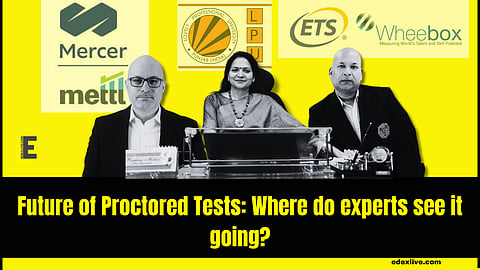

The pandemic brought forth a massive change in the arena of education. Not only were the old conventional models of education thwarted but students were forced to acquaint themselves with new processes. Universities and institutions quickly adapted to a form of education bolstered by technology. Examinations were being conducted in unconventional ways, and a new model was adapted by educational institutions and many agencies, where they administered tests online via remote proctored test software.
How does a proctored-style examination work?
Sharad Sharma, Chief Product Officer of Mercer | Mettl, a talent measurement capability of Mercer, that conducts online cloud-based assessments, explains that tech-enabled assessment processes work differently for different stakes of examinations. For example, for low and medium-stake examinations, an AI-assisted platform would work with or without the presence of a live proctor. In the case of high-stakes examinations, institutions prefer a combination of AI-assisted proctoring and human proctoring that is often supported by a secure browser. The AI-based solutions are cloud-based algorithms that use image-audio-video analysis of the examinee's surroundings and raise a flag on screen whenever an anomaly is detected.
But how can such an exam be effective when there are a large number of students?
To this, Sharma replies their software uses a metric called the Candidate Credibility Index that assimilates the data of a student collected throughout the time of the examination displaying the number of flags, and the duration and would give more details of the anomalies detected if scrutinised by a human proctor after the examination. "If a student is found to have a lower credibility index, they may get caught after inspection of their data, and hence it makes it quite efficient even without the presence of a human proctor," adds Sharad Sharma.
How popular is a proctored-style examination?
Whilst the effectiveness of such a style of examination is debatable, the CEO of Wheebox ETS, an assessment platform and proctoring solutions company, says "The last four years there have been significant changes when it comes to proctored examinations." CEO Nirmal Singh categorises the tests into Burst Testing and Assessment of Demand (AOD), where the former is applicable for tests taken on a large scale on a specified day, and the latter takes place comparatively for a lesser number of people, at a preferential time.
Singh opines that burst testing could prove ineffective given that students might lack a consistent internet bandwidth and gadgets that support it. In mature markets like that of the United States, AOD's are popular, as tests like the Scholastic Aptitude Test (SAT) are administered more than once a year, but he adds that India is gearing its pace to assimilate AOD tests, and with the government's policies to reskill and upskill people through digital literacy certification programmes, AOD tests are gaining popularity.
Are proctored-style tests the future of India's standardised testing?
Rashmi Mittal who is the Pro-Vice-Chancellor of Lovely Professional University (LPU) in Punjab hosts a centre-based and remotely proctored exam for their entrance test the LPU, National Entrance and Scholarship Test (NEST). She is of the opinion that such tests are transformative in character and many educational institutions, including LPU, have initiated a practical usage of such online test models. She says, "For several standardised tests and government exams, entrance tests and an online proctored style exam can be the future with advancements in technology."
The CEO of Wheebox ETS affirms the above statement and says, "I feel assessment on-demand tests are the future of testing, even if an anomaly occurs, the examinees will still be capable of booking the test another time, thereby, providing more flexibility."
Sharad Sharma of Mercer and Mettl, further adds that many institutions will follow suit, and will soon adapt to this new model. He also expresses his apprehension by saying, "One of the biggest problems is equitable access to technology across various regions in India, and I do not see such a change happening in the next five years."
